“We made Làbas to create a rupture in the linearity of our history and identity.”
Transcript from the seminar ”Conflict and Autonomy in Bologna – Building the Common” held in Lymy, Helsinki 13.4.2016 with guests from the collective Làbas based in Bologna, Italy.
Part one, Stéfano Re:
Thank you all for inviting us! First of all, I want to say that we are really proud to be able to meet you and have this talk with you, and also to get to know the experience of Helsinki and Finland, and to get to know Lymy. Before we start to speak about Làbas, we would like to invite you to take a photograph with us with a banner in support of Làbas, in the end of the discussion, of course. At the moment Làbas is in a serious danger due to a threat of eviction.
We think it is useful to shortly retrace the history of Làbas, to tell how it was born and grew up in Bologna. To do this I have divided my part of the talk to two sections: I will first tell you what prompted the idea of Làbas, and secondly, about our path from the beginning until to this day, and of the forms this experiment has taken.
Làbas is a social experiment located in an old casern. It has existed for three and an a half years now – I will show you some photos from along the way. This space did not come from nothing. Most people who occupied the space had both individual and collective experience of social and political activism. In particular, they were part of TPO, a social centre in Bologna that has existed for 20 years now. TPO is one of the most important social spaces and political collectives of Bologna, and in 2007 it was legalized through an agreement with the municipality. So TPO had only a one social space in our city before Làbas.

The reason for making the decision for occupying a new space came from a discussion within the TPO, within our collective. We felt that we had great political and social power and potentiality within us. But we could not express it and were wondering, why? We came to the conclusion that the reason for this inability was the influential history of the social space of TPO, and especially its legalized form, which is a mediation with power. Our identity made it difficult for us to reinvent our political practice to meet the actual social demand the society in crisis was expressing.
This is the point: we made Làbas to create a rupture in the linearity of our history and identity. To open a new space of urban radical movement and meet the many opportunities that urban social dynamics provide. We can use this image: Làbas was a white sheet, an experiment for rebuilding a new identity. Not the same position than the one we had, but one that is different and more useful.
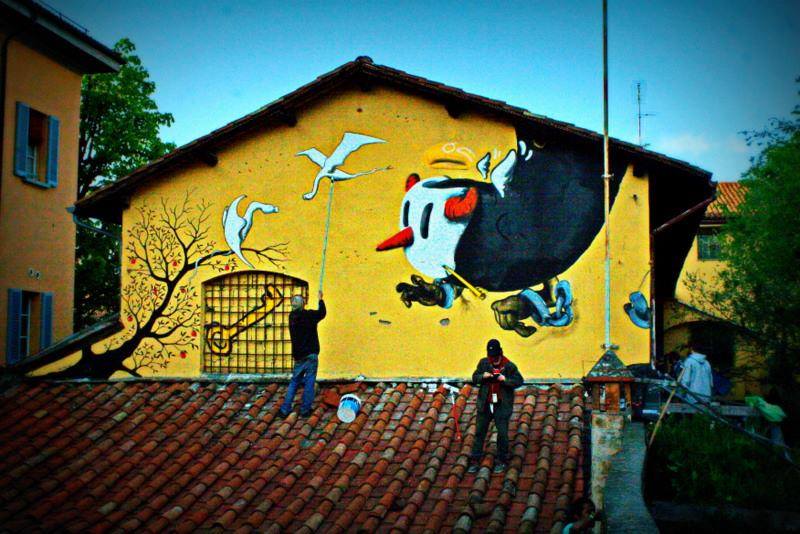
Okay. What did we actually do?
First of all, we started again the practice of illegal occupation, the appropriation of urban space. In the 30th of November 2012, we entered for the first time the ex-casern of Masini, a state-owned public space, which had been disused for a dozen years. I would like to emphasize two aspects of this beginning. First of all, we decided to occupy Masini the day before a Europe-wide strike that went by the slogan “Take the Strike.” This is a symbolic, but important detail. It is important because since the beginning we conceived the space of radical change from a transnational point of view, meaning that we have to think and act at least in an European level or we cannot accomplish anything.
Secondly, we conceived this new occupation literarily as a laboratory against the crisis. This means that we didn’t create just another social center according to the classic Italian tradition of political movements. Yet we are completely a part of this tradition. So we searched practices for breaking the submission to capitalism that uses various forms of power, like centralization, austerity-politics, permanent precarity and deep exploitation, massive impoverishment, etc. We searched for a practice that’s at the same time radical and has a large consensus. A conflictual practice, but one that at the same time could provide a real answer for the people, together with the people – a lot of people.
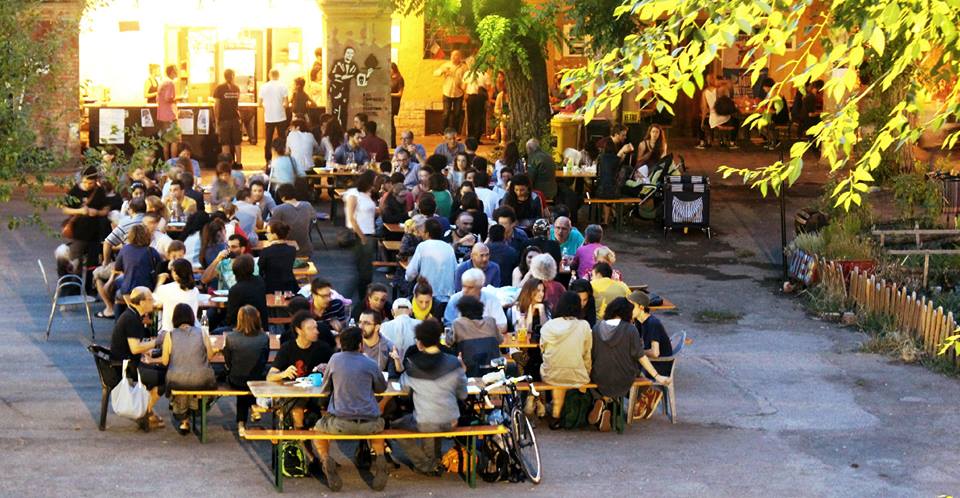
One can understand that already for thought this is a very ambitious goal, and even more so to try to make happen. And in the first months of the occupation it was very, very hard. In some pictures you can see the state the space was in – it was very, very dirty, in a terrible condition. Only five weeks after the first occupation the police evicted us, just before the Christmas vacations. Bologna is a university city, there are lots of students, in our collective too, so during the Christmas people disappear, they go back to their hometowns. But we went back in the 9th of February and started a second occupation. After that we had to face a long period of hard work, not only political but also manual work, because the space has an area of 9000 square meters, and as it had been abandoned for more than ten years, you can imagine the state it was in after this period of disuse. A dirty, disorganized space.
It was also hard for us to imagine a more useful arrangement of the space. And for political work, even the location of the space was problematic, because Làbas is situated in the richest and most right-wing neighborhood of Bologna. In the beginning, and for a long time afterwards, the residents were not happy we were setting up a social center there. We did not know so well what type of activity would be best for creating a new kind of social space. The turning point came when we decided to host a market of local food and products from the Campi Aperti, or Open Fields, an association of local producers. This choice was made because we had made an urban vegetable garden during the previous month, and wanted to address the issue of food sovereignty.
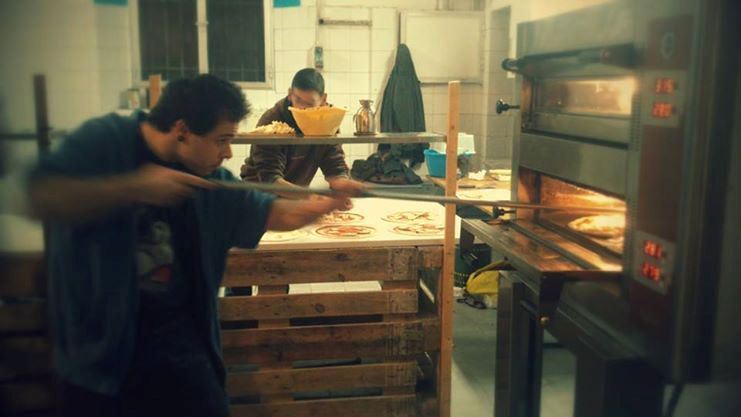
This market was, and still is, a space of small business, but without the capitalist market rules – the producers are small scale farmers. Actually, after we had had the market on Wednesday a few times, it became an occasion of free aggregation for the people, and through it several different activities were organized. These activities included organizing a kind of kindergarten called La bimbi (Italian for children), concerts, artistic events, our Biopizzeria (an organic pizzeria), gardening, carpentry – we even constructed a self-made brewery. A lot of different activities, but always linked to each other. The market was the spark that engaged this.
Of course, we use the space for a lot of cultural, social and political events, like assemblies, book presentations, discussions, debates, and as a place to organize activism in the city. It is also a space where people can live, containing six flats for around 30 comrades and “normal” people who need a place. Last but not least, six months ago, we opened a self-governed dormitory called Accoglienza Degna, in English something like “worthily welcome”. We made a call for volunteers and around 70 people answered, and now they all together manage the project together with some comrades. They open the space in the morning, close at 10 in the evening, clean the space, cook together, and so on.
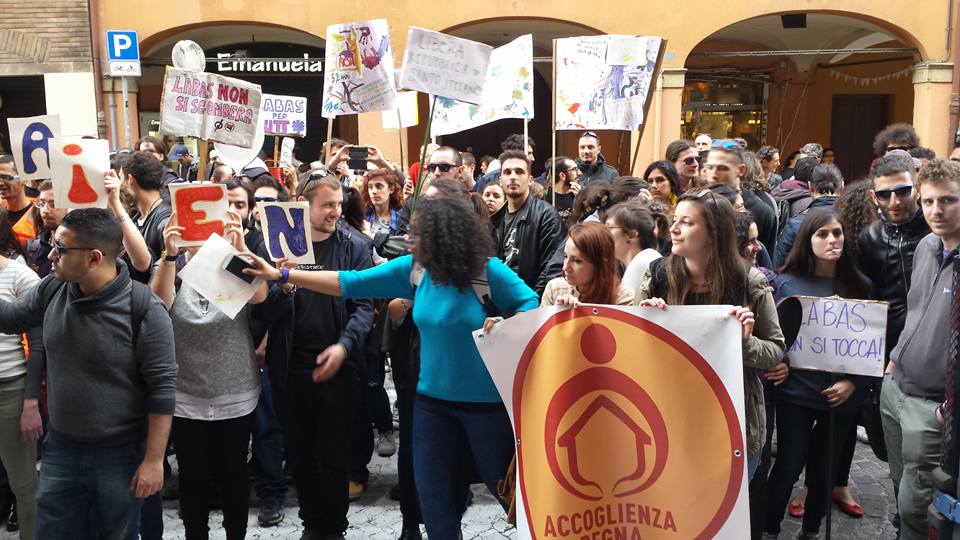
The leading idea is to combine the potentiality of the space, with the power of cooperation, solidarity and social demand. The biggest issue for us has been the problem with housing: it is very difficult in Italy at the moment, and particularly so in Bologna.
What is the common aspect of all this activities? It is what we call mutuality. Our intention is not to cover the welfare state, but to give together real answers and at the same time create connections with the people, and to create new combinations of social relationships. From the beginning Làbas has had a large consensus among neighbors and within the city – but the important thing is to construct a process of recombination of social relationships. We hope to create a kind of constituent relationship that makes it possible for us to position ourselves and act in relation to the city.
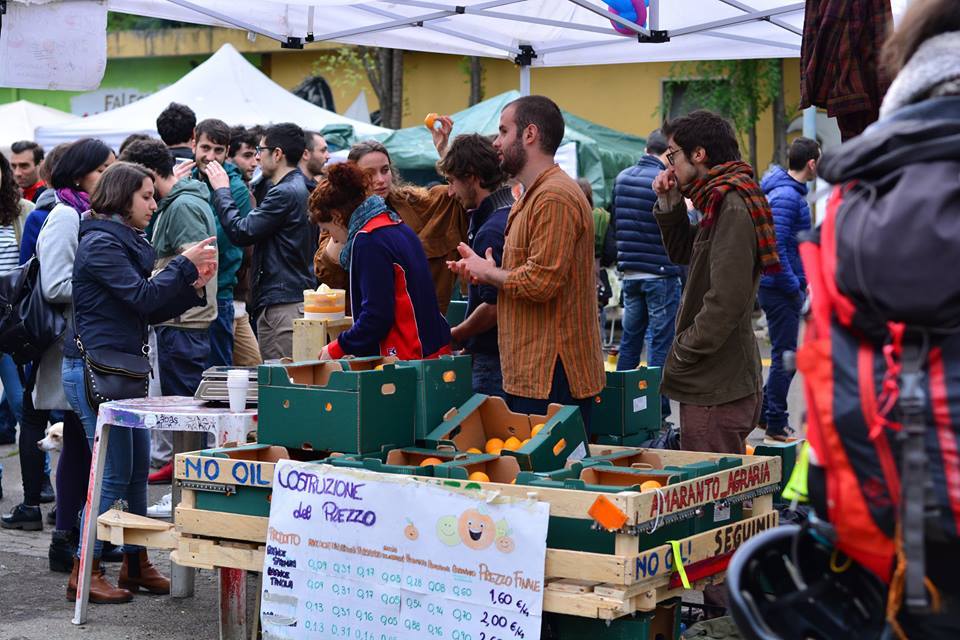
Part 2, Flavia Tommasini:
I will continue with a little story about what has happened during these last three years. As Stéfano said before, after three years we are facing a new phase in the struggle. Three months ago, after lots of threats, an official eviction order arrived from the attorney office. Three months ago we had to decide what to do, as these threats were getting very insistent. We decided to form a committee in order respond to this new situation. This committee now consists of 600 people. These 600 people do not consist only from us, the active members of Làbas, but all kinds of different people.
For example, our neighbors are part of the committee. After three years the neighborhood has grown and changed with Làbas. One important thing for the neighbors is the La bimbi, the kindergarten. In the beginning we were shocked that normal people would leave their children in our hands! Just joking, there are many good girls and boys in Làbas who are students in education and similar subjects. For all the active people involved, the volunteers and others, for everybody, Làbas is a place for applying their knowledge. I think this is important, because Làbas doesn’t only make it possible for people to take their children there or to use it as a space to sell vegetables, but also for people to contribute to the very formation of the space. It’s an opportunity to grow together. We think that it is because of these reasons that we are now six hundred people, neighbors, from social associations and social streets. The most important thing is that people want to protect this experiment.
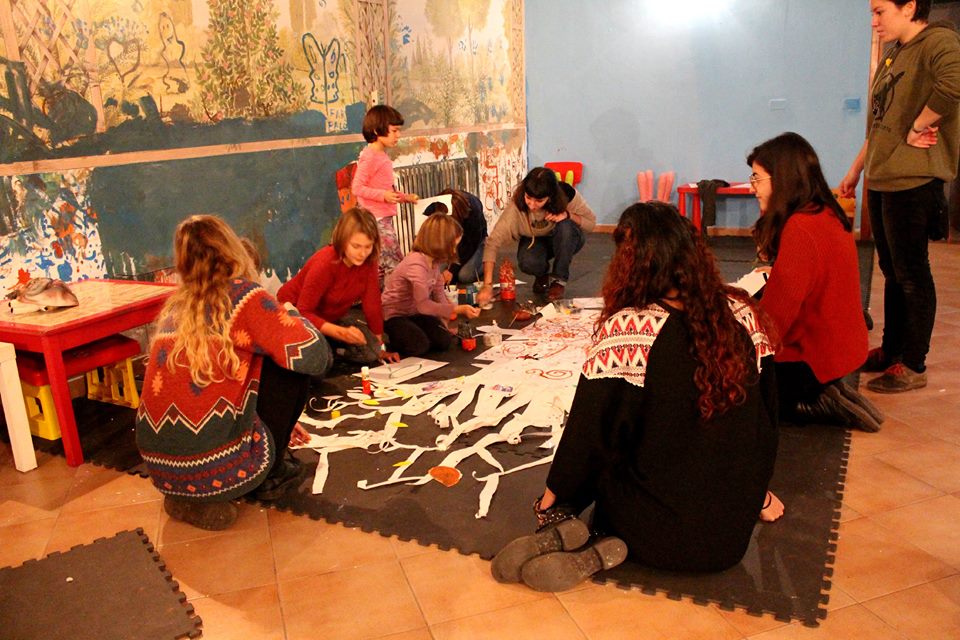
We think that this is a very important change. We decided, for the first time in my experience, that we would partially let go from our collective political identity to connect with different people. We had a very long discussion within our collective about what we should to do. Because a few years ago – in the 90s, during a different time in the history of social centers – we would probably have been sitting with the local administration to search for an agreement for another space only for our political collective. But this is another story, because we understood that during these three years this old casern had become something else than just the house of Làbas – it had become a symbol for a different way to construct together a new idea of the city.
Our committee decided that this is the place where we live and we should take care of it. We didn’t want another parking space – they are planning to build a parking space, a luxury hotel or a shopping center, or something similar in the place of Làbas. The area is quite upper class. Therefore it is important that people in the committee said together: “We don’t want another luxury development in the center of Bologna, we want other things. We want a capitalist-free space for our children. We want to decide for ourselves, because we are finally taking care. These stupid power-hungry people can’t decide instead of us about our future!”
I think this is a very big change for us. For three years we worked very hard in Làbas. At times we were quite alone, we didn’t have electricity or water, we lived in there and it was very cold in the winters. Now we are happy, of course, but during these three years the situation was sometimes very difficult. Therefore, after all the hard work done in this place, we decided to entrust this important political wealth and share it with other people. It’s a big change for us, to imagine a new way of doing politics. And I don’t think anyone expected that.
Now we are facing a crucial moment. A lot of people are joining in this fight – we have found a new power in the process. For example, last Saturday the committee called for a street party in the street outside Làbas, in partnership with all the neighbors, shopkeepers, local farmers, social associations, etc. It was incredible, 10 000 people came! They didn’t come there for just the party, but because everyone wanted to defend this experiment. It was incredible.
Last week we also made a little intrusion in the council house where the councilmen, the directors of Casa Depositi Apprestiti, were having a debate. Technically they are the owners of the casern. They are the same people who are planning the luxury hotel in agreement with the local administration. So, we interrupted this debate, and for the first time they said that they could probably talk with us and that perhaps we could sit together and think of solutions to the situation. The first thing that happened was that the attorney officers said that if there is a dialogue with the people from Làbas, then they can stop the eviction for now. Only for now.
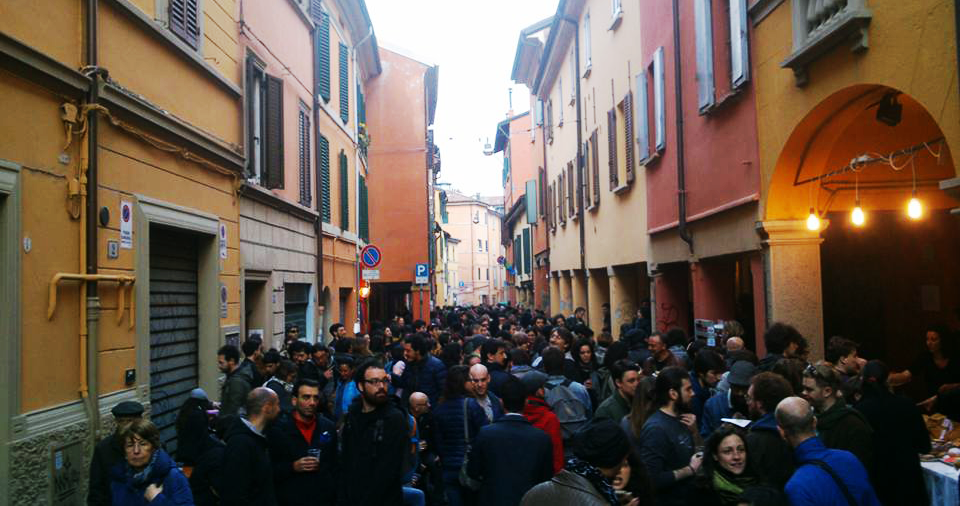
This is the situation. We are carrying on, stronger and more determined for sure because of these important results, 10 000 people in Bologna. Bologna is not a very big city.
Now I want to share some considerations about this experience with Làbas, about what it means for us and about how this experience has opened a new perspective for our movement in Bologna. Through the experience we have had with Làbas, we have realized that the territory and the local situation is very important for building an alternative common statement. Our idea was that we come from the big cycles of struggles regarding territory. There has been struggles against the high-speed velocity trains in Northeast Italy, against the extension of a U.S. army base in Vicenza, in Naples against ways to burn the garbage. We also followed the struggles of logistics workers in Italy with ADL, the autonomous union for independent workers. From these struggles we have learned about the power that local issues like mobility have for people and for their subjectivity. People understand very well what you say when you speak about their concrete problems. But the big question is always on the table: How do we generalize these struggles? How do we apply the constituent point for building a new society?
These things we are doing are experiments. Làbas is a big experiment because when we started it, we didn’t know what would happen. I remember the first time we opened the door and we realized how big the space is. Nobody knew there would so much space to manage! Now we are trying to find answers. We are starting by questioning our cities. For us, Làbas is a very good way for expressing our right to the city – I mean re-appropriation, mutuality, cooperation starting downwards going up, in a word: common life. We are trying to spread this everywhere. It’s just a little spark but we can imagine how we can spread this spark in our city. We realized that there exists a lot of people thinking the same way as us, who’ve had had enough with our politicians, had enough with this blind way of administering the city. The people around us are saying: “it’s enough, it is time for a change.”
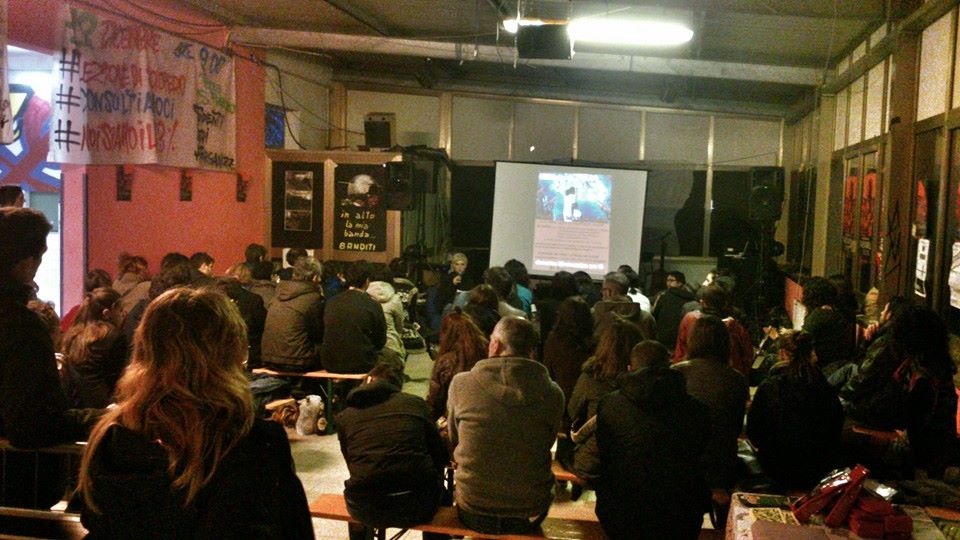
So, we decided in December that maybe there exists a space for us to participate in the elections. In June, in Bologna, there will be an election. We want the possibility to govern our city ourself. Of course, it is a big dream that has got its inspiration from very different situations. This last year we travelled a lot, we went to Rojava. We saw the construction of autonomy in the municipality of Kobane, and it was an incredible experience of real democracy with different people who practice democracy together. We went to Spain of course, before and during Podemos to witness the experience of that movement. We went to Europe because we participated in the activities with Blockupy in Germany. Of course, each experience is very different because the territories are different, but it is very inspiring for us. Now we are doing this crazy thing to participate in the election. How we can mix our political identity with others is a big challenge for us. Of course, the challenge is that we do not want any affiliation with the traditional political parties. Therefore, we participate on a civil list called Coalizione Civica. We have our own candidate on the list and we are also challenged by people who don’t necessarily belong to the movement.
For the first time in Bologna, most probably, people from an occupied social center are planning for running in an election. When the threat of eviction came in December we had our first assembly about the matter. In the first assembly there were around 200 people. The participants asked what we could do for building the future of Bologna outside of the framework of the traditional parties, outside of this inept system that tries to manage the crisis by cuts and repression. That’s what the power elites in Italy are suggesting for solving the crisis. We think it is time to not only repeat that we are the 99%, but to put together something really new, to free our city and position it in an European network. Because we are not interested only in the local perspective, we have to focus on the bigger one as well. The question of uniting, combining these experiences, this is a very big question. But we are thinking a lot about it.
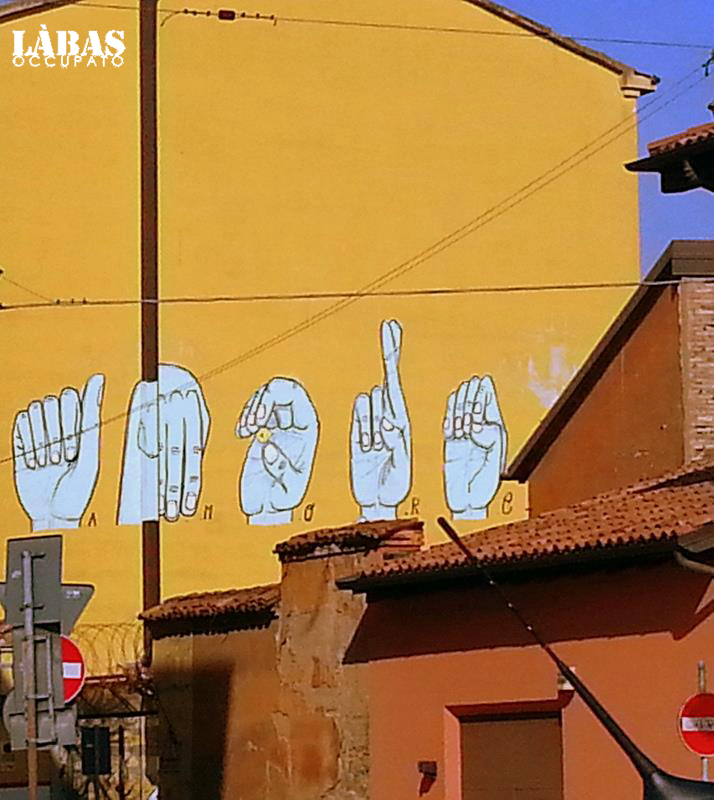
Finally, I want to share a reflection of our experience. The No Global was probably the most important movement in Europe lately. That movement had both the biggest and the lowest moment at the same time, in Genova in 2001. Last year we could finally look at the past 15 years and reflect on our mistakes and on our defeat. Of course, it is not all our own fault – capitalism and state violence were important factors of its downfall. But after 15 years we thought that perhaps we failed to convert a global and massive movement into an alternative and constituent power. At the time we chose to delegate the change into a traditional, left-wing party, to the system of traditional parties. We ourselves returned to the movement and refused any form of political representation. It did not occur to us that probably we are the best form of representation for ourselves.
The last thing I want to say is that this change does not mean stopping our radical practice or our struggles or becoming something different. It is impossible for us to imagine ourselves as proper guys with suitcases! But we have a deep conviction that it is time for us to share and distribute our know-how and our radical practice. 10 000 people came to Làbas. For us it is not just a conflict with the police, it is a real conflict of power in regards to the city. Maybe it is time to share this knowledge with everyone who want to try to build together with us a really common society. Thank you!
Special thanks to Jaakko Karhunen for editing.

2 thoughts on “Conflict and Autonomy in Bologna”
Comments are closed.